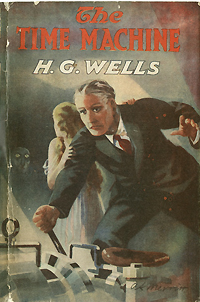The World That Darwin Made
Literature

H. G. Wells, The time machine, 1895
Darwin’s ideas made a huge impact in literature. By the end of the nineteenth century, literary development was tending strongly toward realistic, even naturalistic works, which laid out a world devoid of overt morality, where primitive emotions, self-centered motives, and hereditary failings came to rule lives and societies. Darwinian evolution was of a piece with this, especially as some writers, such as Émile Zola (1840-1902) in France, hoped to develop a “scientific literature,” that is, imaginative writing that so emulated reality that it could present life “under the microscope.” Zola was influenced more by the French tradition of philosopher Auguste Comte (1798-1857), founder of “positivism,” critic Hippolyte Taine (1828-1893), and physiologist and physician Claude Bernard (1813-1878), than directly by Darwin. But in the American context, Zola and Darwin were equally influential, especially in the works of such writers as Jack London (1876-1916). He set his most famous novels in the wild; married for the eugenic reasons of “health, sanity, and compatibility,” in order to create good offspring; and came to embrace the worst attributes of racial thinking for ostensibly Darwinian reasons: the “Teutonic” race, he thought, displayed adaptability and persistence lacking in all other races. The cohort of American writers of the turn of the century were broadly Darwinian, providing gritty naturalistic writing, exemplified by the work of Theodore Dreiser (1871-1945), Frank Norris (1870-1902), Stephen Crane (1871-1900), and Edith Wharton (1862-1937).
Imaginative Darwinism emerged also in the new genre of science fiction, which came at the boundary of action novel and social allegory. Novelist H. G. Wells (1866-1946) used The Time Machine (1895) to spin out how current social structures might evolve in the far future, with two distinct species, Eloi and Morlocks, at war with one another, having evolved from the English upper and lower classes. The Island of Dr. Moreau (1896), predicated on the plasticity of living creatures, took on the question of the human-animal boundary. Both The War of the Worlds (1898) and The First Men in the Moon (1901) presented non-human societies—these served as possible types of human social evolution into the far future, bad and good, and implicitly critiqued Western imperialism. Darwin’s ideas freed up the imaginative mind to create new civilizations and cultures, and so to explore new ways of ordering society. With antecedents in Plato’s description of Atlantis and Thomas More’s Utopia, utopian literature came into its own in the post-Darwinian world, and is now a settled part of our cultural landscape.
Last Reviewed: May 7, 2014


